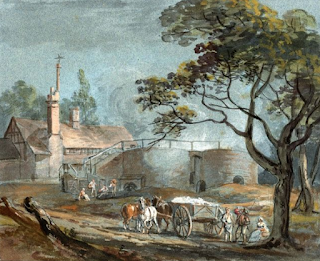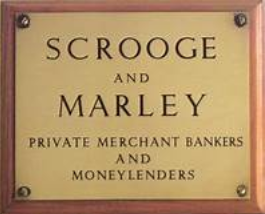We closed the previous posting on this subject by wondering why, when the history of backing a financial asset with government debt had proved so disastrous in the South Sea Bubble and the Mississippi Scheme (which we didn’t go into), anyone would have been tempted to try it again. After all, one definition of insanity is doing the same thing over and over and expecting different results — and the one thing Ebenezer Scrooge was not was crazy, either before or after his completion.
We don’t say “Scrooge’s reformation,” as one of the points of this series is that Scrooge — like the rest of us — had whatever was necessary to make him a good man, but he didn’t complete the process until the Spirits gave him a nudge. Even then, the social order of his day (the 1840s) prevented Scrooge from being able to do as much good as he might otherwise have been able to do.
In particular, the financial system was badly structured and about to get much worse. As it was, it was much easier for a rich man to get richer than for a poor man to have even a modest amount of wealth. The financial system favored the already wealthy, as did the political system and the legal system. It was, in fact, extremely risky for workers to own a part of the company for which they worked, as the Limited Liability Act wouldn’t be enacted for another decade or so.
Even worse, the financial system had taken several hits during and after the Napoleonic Wars so that by the 1840s when Scrooge was a banker in the City of London, there were increasing calls for reform to prevent any further financial disruption. This, of course, raises the issue of whether it is possible to legislate or mandate prosperity. We think that Scrooge probably would have sounded off with his “Bah, humbug!” catchphrase both before and after he was visited by the Spirits, before because he would have been annoyed at any interference in the market, and after at the idea that government should do what individuals had it within their power to do.
Scrooge, of course, would not have had a concept of social justice by means of which people can organize and restructure institutions to repair the common good so that it works for all. He would have figured that if there was something to be done, do it yourself, and don’t expect the government to do it, as that would increase taxes and probably only make things worse.
 |
| Production and consumption were directly linked. |
Anyway, the financing of the Napoleonic Wars had so screwed up the financial system that it changed the meaning of the business cycle. Previously, “business cycle” had meant the annual round of production and consumption that conformed (more or less) to the four seasons and the economic activities associated with each one.
Production and consumption were inextricably linked; if you could produce, you could consume. If you were unable to produce, private charity and public welfare took care of you. If you were lazy and shiftless and refused to work, begging might work, but you could also go to prison.
The financial system reflected this. Except for a relatively small amount of government debt and gold and silver coin, the money supply consisted primarily of mortgages and bills of exchange, together with privately issued banknotes backed by mortgages and bills of exchange. The money supply was asset-backed, and the banking system tried to make sure that the money supply was adequate for the needs of commerce.
 |
| The "Spinning Jenny" vastly increased production. |
Two things happened, however, to disrupt this system. First, the Industrial Revolution made possible by the Financial Revolution began destroying small ownership as human labor lost out in competition with more productive and cheaper technology. People were forced out of their small businesses and farms and into the factories.
Instead of working to produce for themselves, they now sold their labor so others could produce with the new machinery. This disrupted Say’s Law of Markets, as the owners of capital could not possibly consume all they produced, either directly or in exchange, and workers could not produce with their labor as much as they wanted or needed to consume. Production and consumption became disconnected.
 |
| Jean-Baptiste Say |
Second, the massive amount of debt issued during the Napoleonic Wars broke the essential direct connection between money — the means by which people exchange what they produce for what others produce — and production. Previously, the primary way to create money was to back it with existing production by means of mortgages, or with the present value of future production by means of bills of exchange.
Now, the “total war” concept required that the full resources of the nation be put into the war effort, and that meant that government became the largest single consumer. This dealt Say’s Law the death blow, as Say’s Law assumes that in order to consume, you must produce. Government, however, by its nature produces nothing, at least in the way of marketable goods and services.
By backing a large part of the money supply with bills of credit backed by the present value of future tax collections — which means the wealth of others the government takes to defray its costs — the British government was able to consume without producing. It also convinced a great many people, some of whom should really have known better, that private sector bills of exchange and mortgages not only shouldn’t back the money supply, they couldn’t. Only gold, silver and government debt were “real” money.
This, frankly, was a disaster for the small farmer and businessman. Where previously it had been difficult for small farmers and businessmen to obtain necessary credit, it now became virtually impossible.
 |
| A factory could produce more in a day than a man in a lifetime. |
Before the Napoleonic Wars a mercantile (commercial) bank could create new money if someone brought in a sound project for financing. If even a small businessman or farmer had collateral, he could get a loan of new money, and repay it out of the future profits of the venture he financed with the proceeds of the loan.
Following the Napoleonic Wars, most mercantile banks stopped creating money for small owners, preferring to lend only out of existing savings. It was, in fact, becoming very risky for mercantile banks to lend money at all to small farms and businesses. Economies of scale enjoyed by the new factories combined with the inflationary pressure from the flood of money backed by government debt made small loans much riskier.
All of this was bad enough, of course, and was rapidly squeezing the non-rich into a condition of permanent propertylessness. The newly rich industrialists, merchants and bankers were riding high, however. Agriculture where the old money was invested was in trouble for various reasons, and landlords were desperately trying to increase production to make up for falling prices, but there was a disaster brewing there, too, especially in Ireland, where even the vast landed estates could not produce enough to preserve the income of the wealthy at former levels of purchasing power.
Starting about 1810, however, a new variable was thrown into the economic equation, and it soon led to the first modern financial panic and the start of the business cycle redefined as a cycle of boom and bust, as we will see in the next posting on this subject.
#30#


